For decades, people have been talking about how digitisation is changing work. And work certainly has changed. We have moved from manual labour to knowledge work and from routines to robotics. Liberalisation of international trade has reduced the amount of factory work in western countries. In recent years, this has also been the case with knowledge work as tasks are outsourced to emerging countries with low labour costs and a high level of education, such as China and India. The justification for this development has been the economy.
The same phenomenon also characterises the discussion of work: the topic is approached mainly from the economic perspective. This means that since the economy is in crisis, work must also be experiencing a crisis. Or maybe not. In any case, discussion about the change in work is far too narrow.
The economy is only one of many areas experiencing a crisis and affecting the change in work. Nature is also in trouble. The sustainability crisis has highlighted the limits of our resources and how nature affects well-being, and made it even clearer that our actions have to change very quickly. The planet’s resources are limited. We have to consume less and still produce more added value. The loss of biodiversity, depletion of natural resources and rise of renewable energy are forcing us to move from a linear economy towards a circular economy and nature-based solutions.
For example, the energy transformation can affect work, because the production methods that replace fossil energy may require more human work. The most important move in terms of the future of work is to manage the harmful environmental impacts of work.
Age distribution also has an effect on work. The population is ageing, but immigration means that the workforce is not decreasing in size. At the same time the global population continues to grow. Climate change is reducing the space available for living and agriculture, and food and other resources are not distributed evenly or fairly. An increasing number of people have to flee war, drought and famine. Steadily increasing migration creates feelings of insecurity in the countries of origin and destination. This leads to hate speech and conflicts. And unequal societies have extreme competition for jobs and how to make a living.
A choice or a must?
Many elements of change are set and people do not have much chance to influence them. Although many forces affect work, this does not mean that the change in work is progressing irreversibly in a certain direction. It is affected by the choices that people make.
More and more people are looking for ways to control their lives. More and more people are becoming exhausted by job pressures and changes and have difficulty finding the motivation to work. More and more people want to do work that means more than simply making a living. Therefore, this is also a matter of making value choices.
A rise in the value of individuality and new forms of benevolent communities have increased people’s opportunities to find meaningful work. In terms of sustainable development, meaningful work is essential because it simultaneously supports people’s well-being and changes the world. But who decides what kind of work is meaningful – and for whom? We should also be talking about this.
There has recently been a lot of talk about whether work is a right or an obligation. The number of long-term unemployed has also increased in Finland and fewer people have been able to find work that corresponds to their education – at least near their homes. Basic income has been proposed as a solution, but pilot projects are limited and the subject has only been discussed on a very general level. Instead of an ideological basic income discussion, we need to talk about whether a person should accept any kind of work in any location and how work should be distributed, so that the people who cannot find suitable work in today’s labour market could also participate in working life.
Some of us also wonder: Do people exist for work or does work exist for people? Is all work – including work that destroys people or the environment – useful and necessary? Are we prepared to accept inactivity from those who have money but not from those who do not have money?
What about volunteer work: how should it be valued? Many people do volunteer work because they perceive it as a meaningful and pleasant way to influence society in their own daily lives. As the population ages and immigration increases, volunteer work will play an even more important role in Finnish society. But does volunteer work affect the change in work?
Slow and fast change
When the nature of work changes, the systems that steer it cannot always keep up with the change. The dynamics of power in society are also constantly changing. Union activities are evolving and so is the position of employees. Lobbying by large corporations contributes to reducing the power of democracy. But a counter-force always develops for every force.
Social relations also reflect on the change in work. When employees are in a weak position, the terms of employment deteriorate and it becomes less expensive to use labour. In this case, companies have no incentives to invest in productivity growth. And this, in turn, slows down technology development.
The change in work and its effects also vary depending on the sector. Today’s society is organised on a functional distribution of work, education, job descriptions and the related responsibilities. This is often discussed only when the system is abused, as in the case of fake doctor Esa Laiho. Even today, nearly all fields already require a broader understanding of sustainable development and, for example, the basics of climate change.
People are not all the same. Not everyone has the same prerequisites for work. Some people need more support in finding employment. Not everyone wants to be self-employed or an entrepreneur, and artificial intelligence and digitisation cannot replace work that is essential for human well-being. For example, care work is the foundation for well-being and the economy. In other words, it is the most necessary work of all. But are we ready to pay for it?
From idealism to practice
Regardless of whether we exaggerated or downplayed the change in work, one thing is certain. The loss of natural diversity, progress of climate change and depletion of natural resources are causing social pressures. And these pressures are leading to changes in which more people, including employees, are losers.
However, these changes can be anticipated by following plans in relation to sustainable development goals and crossing sectoral boundaries. This allows us to help people who lose their jobs because of the change to find new forms of livelihood and activity that may be even more meaningful.
The Toward a shared understanding of the future of work report (in Finnish only) published in early March provides an overview of what has been said about the change in work. It brings up a lot of interesting themes and ideas, but the discussion remains quite abstract in many cases. We need practical examples in order to understand the change.
Work should be discussed in an understandable manner and not abstractly. We need to use words that people understand, listen to people’s real life experiences and avoid talking only about money. We also need to go beyond ideas and turn them into actions. Otherwise, good discussions will remain at the level of idealism and only result in a list of noble wishes.
Change is always an opportunity. This is also the case with the change in work. However, in order to adapt to change it is also important to understand the nature of it. This is why we have to understand that economic crisis and digitisation are not the only reasons for the change in work.
This article is based on the Finnish Expert Panel on Sustainable Development’s discussions about the change in work. However, it does not necessarily represent the views of the individual panellists.
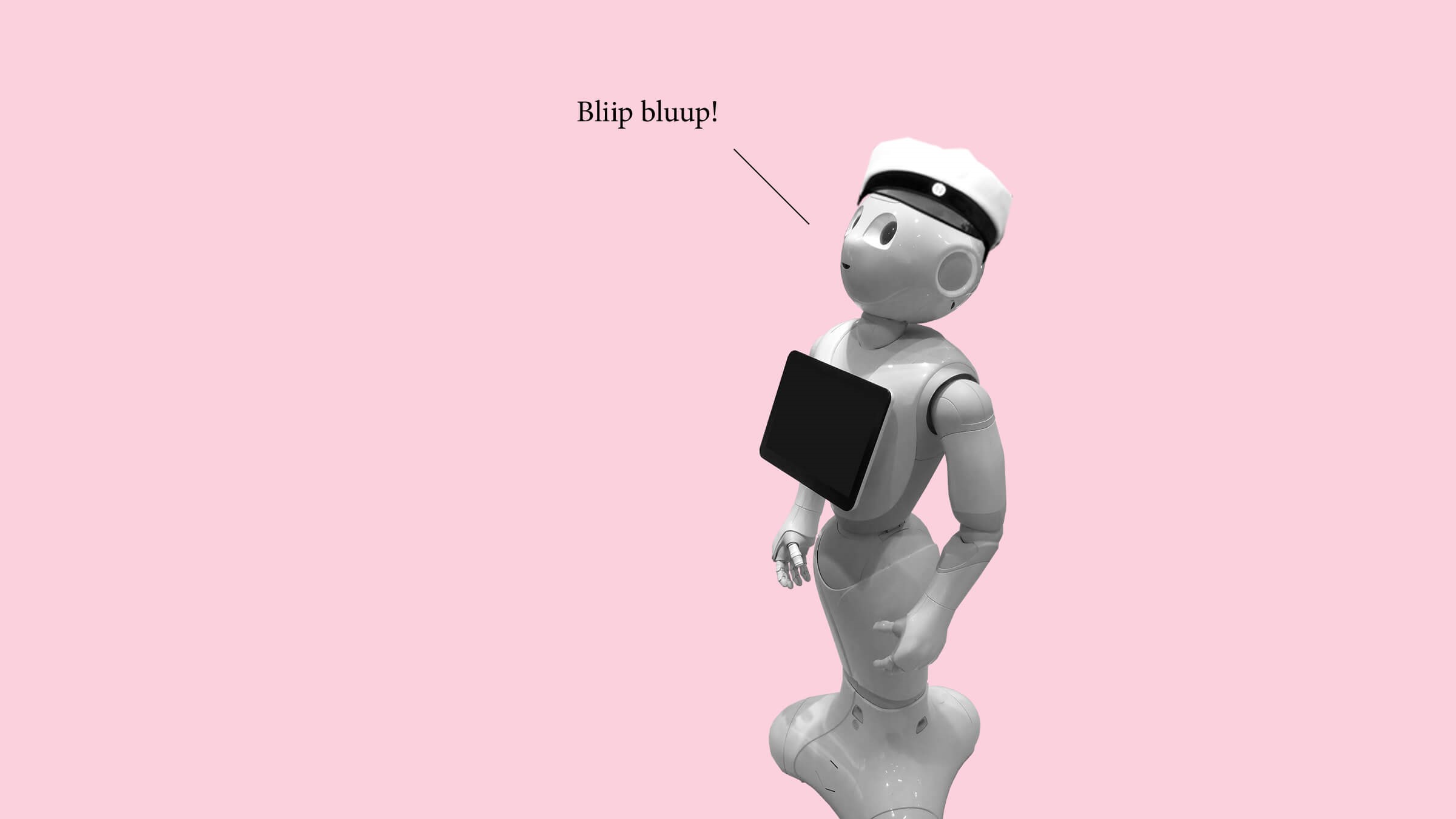


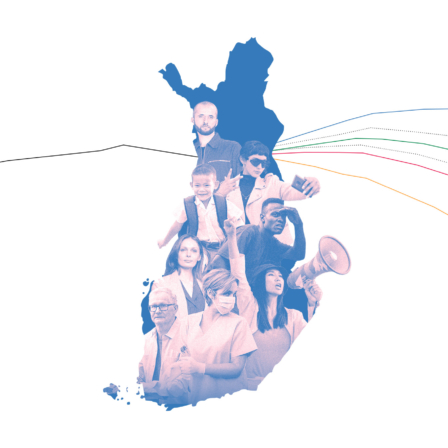

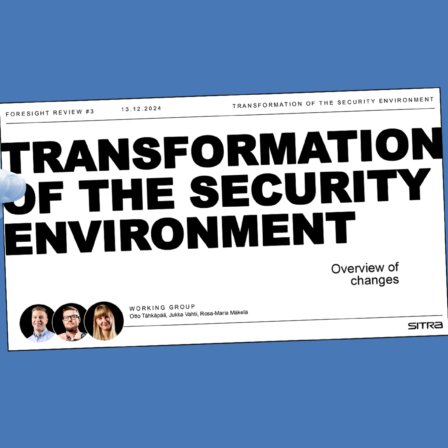
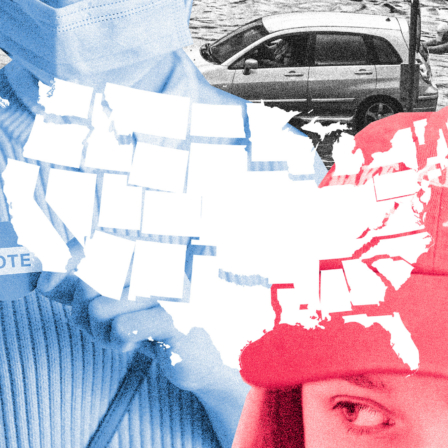


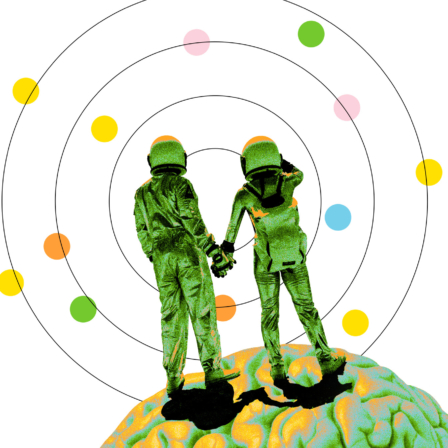




Recommended
Have some more.